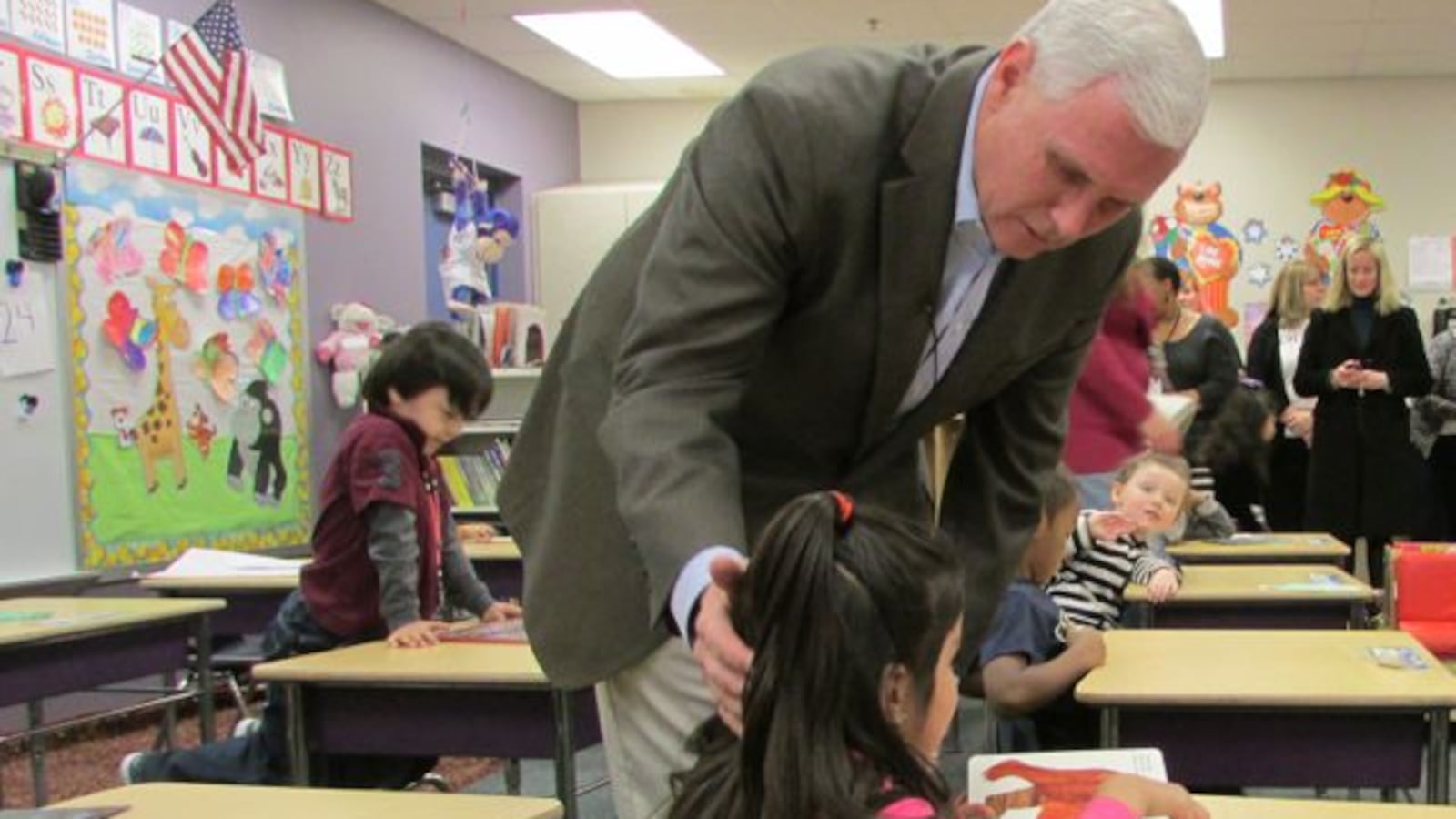(This is one of three stories about Indiana’s about face on Common Core and preschool. For the main story, with links to the other two, go here.)
Ena Shelley, Butler University’s education dean and a national expert in early childhood education, started out 2014 cautiously optimistic about the chances of establishing state-paid tuition aid for low income preschoolers in Indiana for the first time.
She’d been here before. Over the last 15 years, the push for preschool has always ended in disappointment.
But this time, she had a good feeling.
“I was fairly optimistic about it right to the end,” she said. “I knew this was a short session and (lawmakers) don’t like to make changes in the budget in a short session. But they heard so much they almost had to do something. And this is a good first step.”
Why was this time different?
Shelley points to two big factors: strong and growing support for early childhood education from business leaders and Pence’s evolving embrace of the idea of state aid for poor preschoolers over the past year.
Among those lobbying for preschool, Shelley said, were businesses like PNC Bank and business-connected organizations like United Way.
“One of the greatest things that has happened is to have the business community become champions of preschool,” Shelley said. “But it definitely took a governor who was open to listening and learning.”
Over the last few years, the United Way mobilized behind efforts to support quality preschool in city. Their work helped demonstrate to the business leaders they work with the impact those programs can have on children and the long term value for the economy, Deputy Mayor Jason Kloth said.
“The United Way deserves a lion’s share of the credit,” he said. “They were the catalysts for so much of the discussion of the need for early childhood education in the city and state.”
Redelman said business leaders are invested because they work directly with preschool in their communities.
“They’re funding it, they’re serving on boards and their witnessing it on their own working with schools in their communities,” he said.
Some of them lobbied for Pence to get involved. But in 2013, when a preschool pilot program pushed by House Republicans was gutted, Pence was mostly silent.
This year, things were different.
Pence spent the summer visiting preschools and began speaking about the value of state support for such programs. By the fall, he supported the reintroduction of a nearly identical pilot program as one of his top legislative priorities, despite skeptics in his own party, especially the Senate, who thought it should at least wait until the 2015 budget year. Pence even personally visited the Senate Education Committee to testify for the bill, a first for his tenure as governor.
Initially, he did not persuade the doubters, who follow their 2013 script by stripping the pilot program out of House Bill 1003. The pilot seemed dead last month as the bill, now proposing simply a study of preschool, passed the House and Senate.
The mechanics of saving the preschool pilot were mostly handled by legislators.
Budget hawk Kenley, who led the charge against the pilot program on cost worries just weeks before, was the one who revived it, finding the money to start the program as early as next fall at the request of Senate President Pro Tempore David Long, R-Fort Wayne, and House Speaker Brian Bosma, R-Indianapolis. He proposed allowing $10 million in cuts Pence had ordered to be restored to pay for the pilot along with the study.
“I think we’ve done the right thing by the families we’re going to help and by having a longitudinal study of those kids so we can observe the impact in their lives and education success,” a triumphant Pence said last week.
Pence also got help from perhaps an unlikely source, and the other big winners in the deal that made the pilot possible: Democratic legislators.
Democrats have long advocated for state support of preschool but were ready to vote against House Bill 1003 if a provision to make pilot participants eligible for K-12 private school vouchers, which Democrats strongly opposed, was kept in. Democratic leaders believe vouchers hurt public schools by draining away needed funding dollars.
When the voucher provision was removed in conference committee negotiations, Democrats got on board and enough reluctant Senate Republicans finally came around.
“Senate Republicans were not warm to this idea until the waning hours of the session,” said Sen. Tim Lanane, D-Anderson, the Democratic leader in the Senate. “We’re going to have an opportunity now to see the benefits of early childhood education.”
The bill’s requirement of a comprehensive study of the academic performance of children in the preschool pilot frustrates advocates like Shelley, who believe the national research is overwhelming that high quality preschool helps poor children achieve more in school and in life.
“I find it somewhat perplexing,” she said. “But as an Indiana native, I know Hoosiers seems to have this approach where we have to prove this works in Indiana.”
Advocates worry that the study could mean as long as a five-year wait for today’s four-year-olds to score well on the state’s third-grade reading test after they reach elementary school before that can be proven. But Republican and Democratic supporters of state-paid preschool expect it will eventually expand to serve more poor Hoosier children.
“What I hope will happen is we’ll get the data back and we’ll recognize there are benefits to our future best and brightest,” said Scott Pelath, D-Michigan City, the Democratic leader in the House. “And we’ll invest in those kids in the future.”

